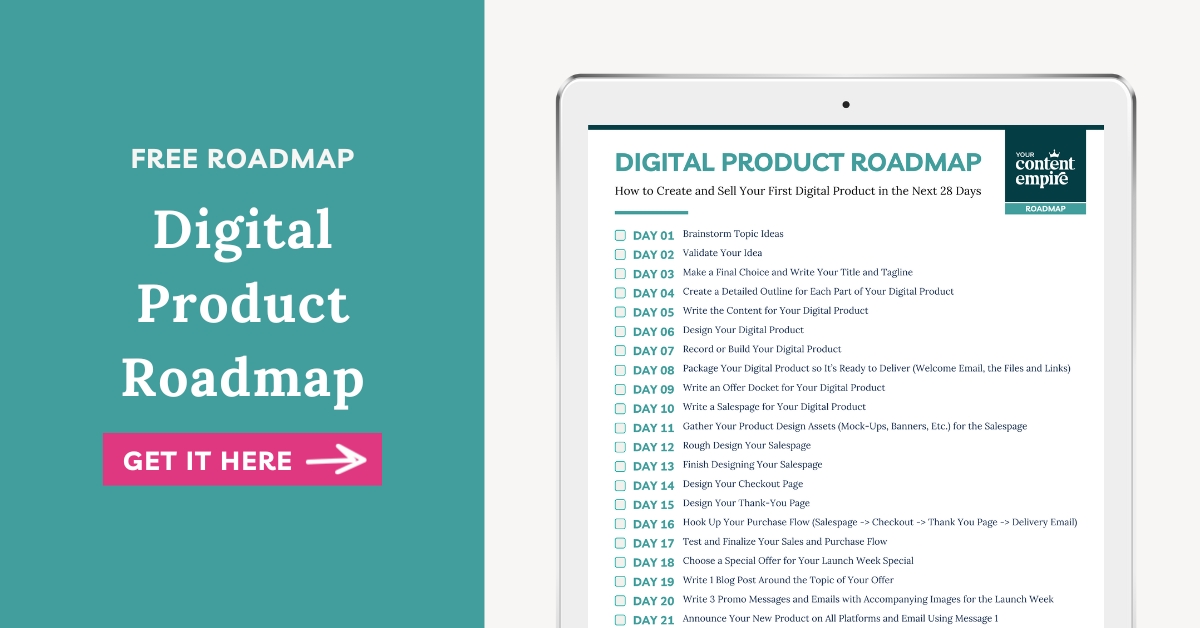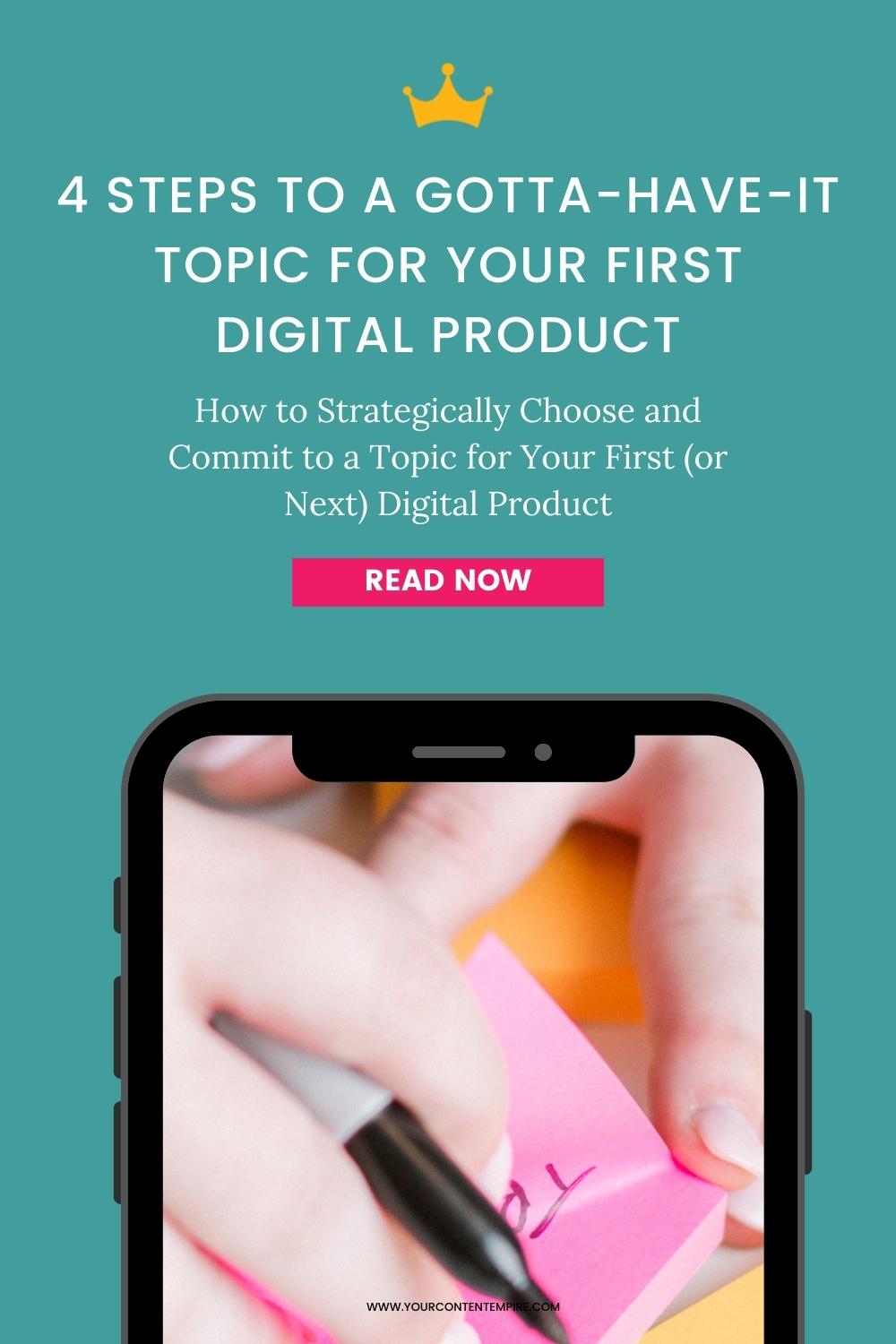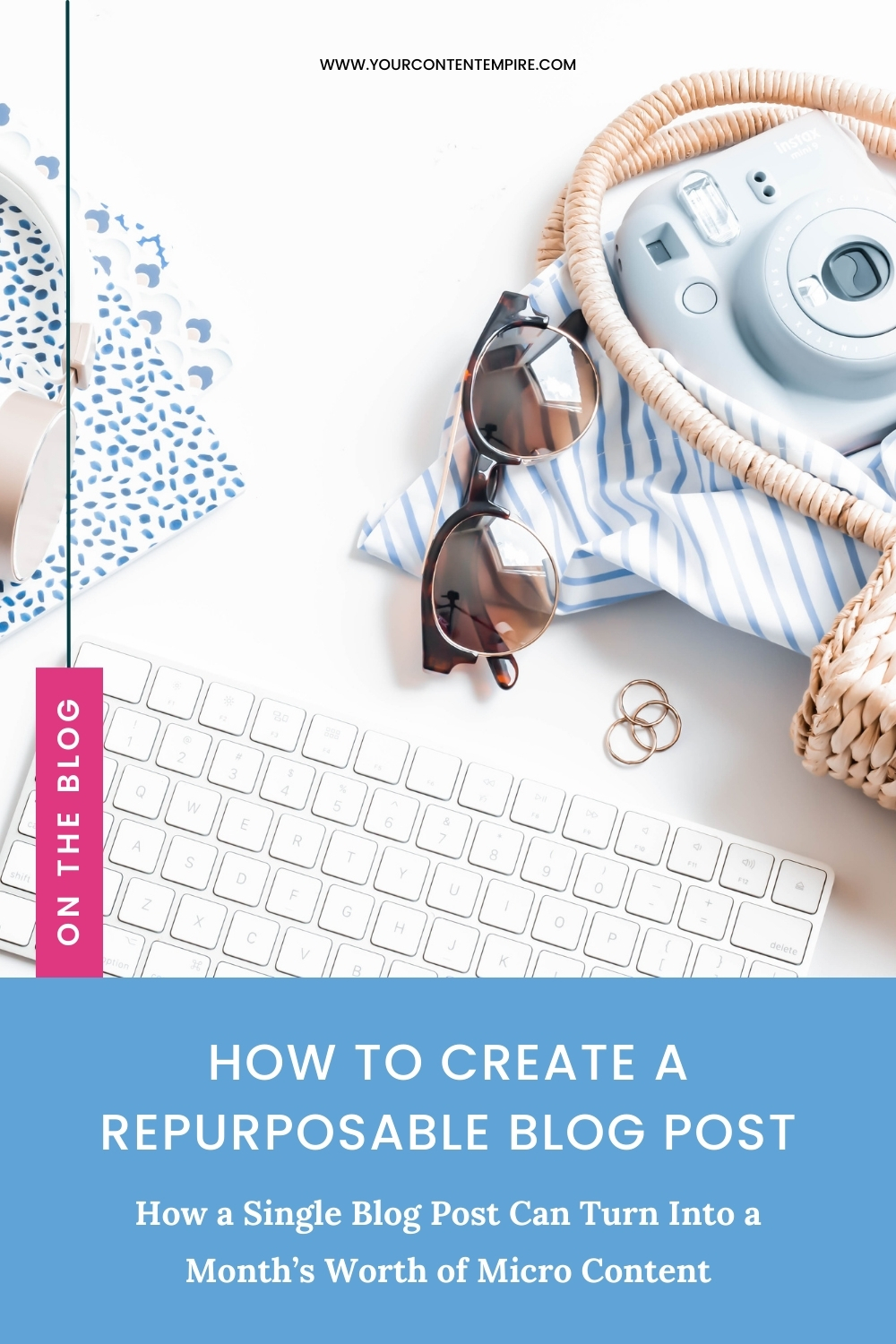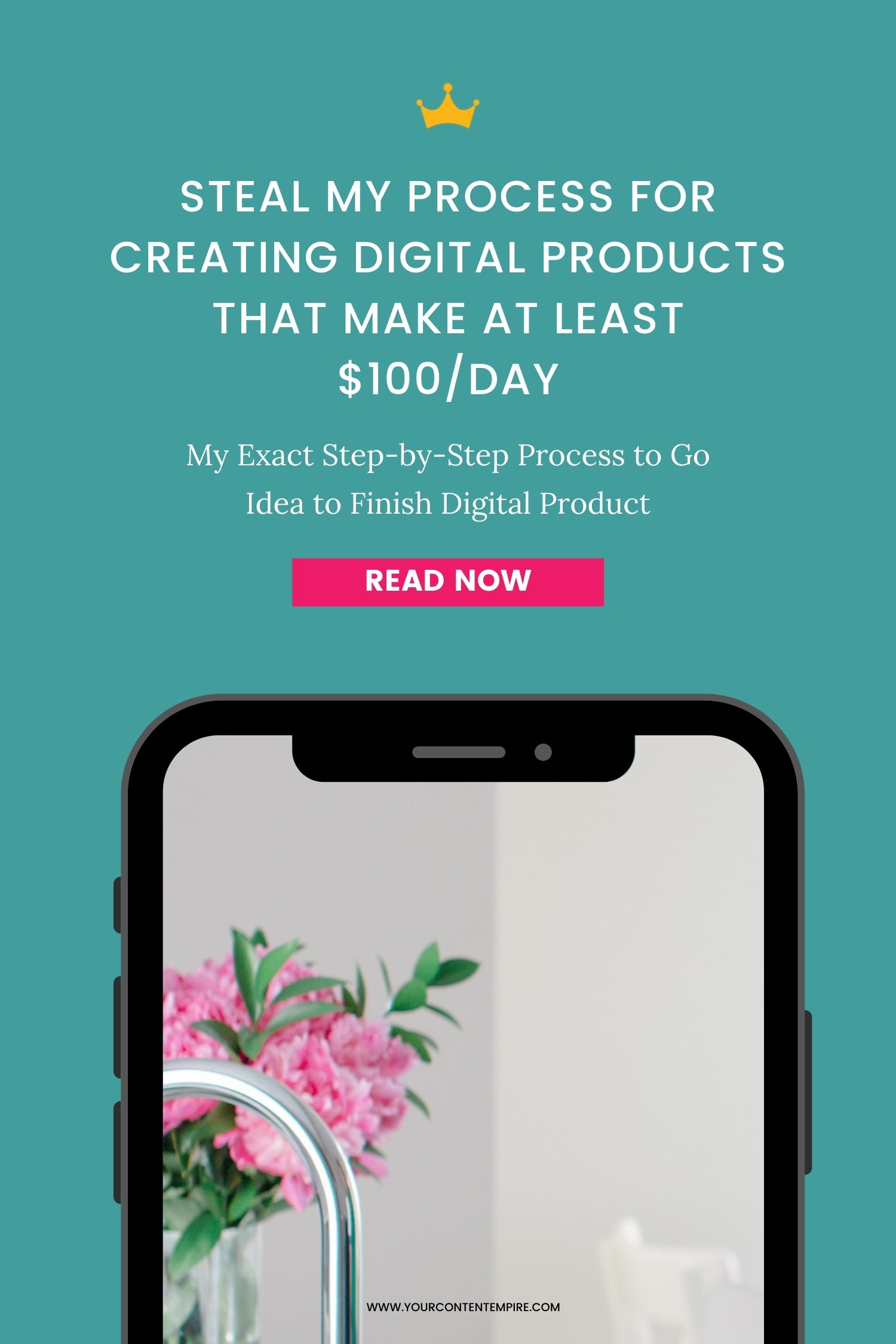Before I created my first digital product, I was only offering my signature coaching program (Your Content, Your Empire) once a year. For the other 11 months of the year, it felt like I was just creating content for sake of checking ‘create content consistently’ off my to-do list
And even though I had too many ideas for digital products I wanted to create I kept putting off actually committing to one idea and creating it.
It wasn’t until I found myself secluded on a week-long workcation with only 1 day left that I knew it was time to stop talking and start creating (typical time-crunch motivation burst). And so, in the span of 8 hours, the DIY Content Empire Kit was born. And even though it evolved into something else (the annual planner and systems kit), in its original form, it went on to sell thousands of copies and I definitely wish I’d done it much much sooner.
Prefer to watch instead?
Maybe you’re in the same boat?
You either have tons of ideas for your first digital product but you’re putting off choosing one. Or, maybe you’re struggling to identify what your people actually want in a digital product. You know you have a lot of know-how to share but aren’t sure where to begin.
In this blog post (the first of the digital product series), I’m walking you through all the steps for choosing the topic for your first digital product.
Want the full roadmap for creating and selling your first digital product?

Step #1: Brainstorm Potential Topics
Note: If you’re already pretty sure of the topic you want to create your first digital product around but just want to validate the final idea, skip to step 2. Otherwise, our goal for this step is to come up with at least 10 ideas for your first digital product.
Here are some methods to help you brainstorm:
Method 1: Productize a Service You Already Offer
Start by evaluating the services you already offer. Is there a part of the process that can be productized? Meaning it can be turned into a system that someone could implement if they had training, templates or guidance even without the 1-1 support.
Or is there a topic you’re ALWAYS talking to clients about? Or a question that comes up again and again?
Here are a couple of examples:
- If you’re a holistic nutritionist, you might offer a small course on gut health.
- If you’re a career counselor, perhaps templates for writing a resume would be a perfect fit for your people.
Start by thinking about what you already offer your clients.
Method 2: Go Question Hunting
Spend a few hours hunting for questions on your area of expertise. You could search for keywords on: Google, Reddit, Pinterest, Quora, Facebook groups or using a tool like Answer the Public.
The best part is if you find a question that a lot of people are asking, it’s going to give you a huge clue that there’s a market for this product.
Here are some examples of good questions:
- If you’re a web designer, people might ask, how do I design my homepage? Or, how do I select colours for my website?
- If you’re a wedding florist, people are probably wondering how to determine a budget for their wedding flowers or how to arrange a bouquet.
The job right now isn’t to evaluate the questions; just try to come up with as many questions as possible.
And just a reminder: your digital product doesn’t have to solve some massive problem. The best digital products are the ones that solve a small but very specific problem your people actually have.
Method 3: Look to Your Own Content
What do you talk about frequently with your audience? Do you have a signature framework that can be mined for your first digital product idea?
If you’re not sure or you haven’t created a ton of content yet, go and create an expertise map. This essentially serves as a library of your intellectual property or know-how. Read this post to get started and download the free expertise mapping template.
Step #2: Validate Your Product Idea
Once you have a few ideas percolating, it’s time to test the waters and validate them.
Here are a couple of ideas to complete this mission:
Method 1: Embrace 1-1 Conversations
The BEST way to validate your ideas is through 1:1 conversations, so go straight to the source … even if it feels a little uncomfortable.
You could contact a past client who you think would be up for jumping on the call, someone from a group program you’re a part of, biz friends who you think might have good intel OR if you’re not sure, try going into a few groups and asking for volunteers.
Make them feel comfortable by making it clear you have no intentions of selling to them (it’s an info-only call) and that you’re giving away a little gift card as a thank you (think $25 Starbucks card or Amazon card, etc.)
Here’s a little script for the ask:
Hey [name or group]! I’m currently working on a new product to help [audience] struggling with [problem related to your area of expertise]. And I have some questions to run by folks who can relate. I will 100% not sell to you (just need your beautiful brain) and as a token of my gratitude am offering a $25 Amazon gift cards. Any takers on helping me out? Please and thank you!!
Then once you have them on the call, here are some must-ask questions:
- What do you feel are your biggest problems when it comes to [area of expertise]?
- If that problem was solved or removed, what would your [business/life/etc] look like?
- What is the biggest thing stopping you from having that?
- What would be a no-brainer solution for you in helping solve that problem?
- How would you feel if that problem was solved?
Method 2: Run a Poll
You can also try polling your Instagram followers or your peers in Facebook groups. This works well especially if you have 3-5 options that you’re considering as topics for your digital product.
Here’s an example of a poll question:

Then use the insight to inform your final topic.
Biggest Pitfall to Avoid: Don’t spend forever on this step! Get in and get out, and onto step 3. I’ve seen way too many talented business owners let indecision stop them from running with a good-enough idea because they’re on the hunt for that one perfect idea. At the end of the day, remember that published is ALWAYS more profitable than perfect. So make a decision as quickly as possible – you can always create something else later.
Step #3: Make a Commitment
Enough dilly-dallying. As important as that pre-work is, it’s time to make a decision. I understand the pressure to make the right one, but at the end of the day, to a certain degree, you’ll never know until you actually put something out there.
If you’re really struggling, I find it helpful to take the emotion out of it by bringing it back to the numbers. So if you’re having trouble deciding what to do, here’s what to do:
- Give each idea a score of 1-10 based on how excited you are about this idea, how easy this idea will be for you to create a product around, how relevant this product is to a problem your people want solved, how much your people want this problem solved
- Then add up the final score for each idea
- Rank your ideas
- Identify your winner
Before moving on: Make a final decision for your product idea
Step #4: Come Up With A Gotta-Have-It Title
The final step of choosing your topic is packaging it up with a title and descriptive tagline.
Craft Your Title
The title should ideally tell us exactly what your product is. The only exception being if you want to use something short and succinct and pair it with a tagline that does answer those questions.
So start with answering these questions:
- What is the #1 problem this offer solves?
- What is the #1 goal this offer helps achieve?
- What form is the product in (i.e. a course, blueprint, system, kit, method)?
Then distill that down into 3-5 words.
Here are a couple of examples:
- The DIY Content Empire Kit (to revisit an example we’ve touched on before)
- The Profitable Sales Funnel Generator
Write Your Descriptive Tagline
Finally, add a tagline that provides context to your title and answers the question, “how does this work.”
Here’s a mad-libs formula to get you started:
A [what it is – program, kit, course] that helps you [biggest benefit] without [biggest objection]
Example: A 5-Step System to Help You Take Better Photos Without Expensive Camera Equipment
So Are You Ready to Choose a Topic for Your First Digital Product?
You could have clarity on exactly what topic to run within the next few days—which will get you a lot closer to being able to start selling it than waiting around for the perfect idea to come to you (that fickle muse, and all).
Here’s a little recap of the steps we’ve covered:
Step #1: Brainstorm Potential Topics
Step #2: Validate Your Product Idea
Step #3: Make a Commitment
Step #4: Come Up With A Gotta-Have-It Title
Building a digital product can be overwhelming, and it’s easy to get stuck. But creating this product can be a game changer for your business – it definitely was for me. Download the free roadmap all about how to create and sell your first digital product and come back later for part 2 (creating your first digital product):







